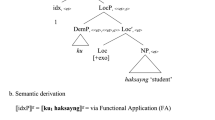Abstract
The goal of this paper is to propose a unified approach to the split scope readings of negative indefinites, comparative quantifiers, and numerals. There are two main observations that justify this approach. First, split scope shows the same kinds of restrictions across these different quantifiers. Second, split scope always involves low existential force. In our approach, following Sauerland, natural language determiner quantifiers are quantifiers over choice functions, of type <<<et,e>,t>,t>. In split readings, the quantifier over choice functions scopes above other operators (such as intensional verbs like must or can). Determiner quantifiers leave a choice-function trace when they move and this trace combines with the noun restriction, which is interpreted low. That split scope always involves low existential force is derived, without stipulation, from Kratzer’s idea that low existential force can be achieved via binding (into the noun restriction).
Similar content being viewed by others
References
Abusch D. (1994) The scope of indefinites. Natural Language Semantics 2: 83–136
Bech, G. 1955/1957. Studien über das deutsche Verbum infinitum, Danske Vidensk-abernes Selskab: Historisk-filologiske meddelelser. Kopenhagen: Munksgaard.
Breheny R. (2008) A new look at the semantics and pragmatics of numerically quantified noun phrases. Journal of Semantics 25: 93–140
Büring, D. 1995. The 59th Street Bridge Accent. On the meaning of topic and focus. PhD dissertation, Universität Tübingen.
Carston, R. 1998. Informativeness, relevance and scalar implicature. In Relevance theory: Applications and implications, ed. R. Carston and S. Uchida, 179–236. Amsterdam: Benjamins.
de Swart, H. 2000. Scope ambiguities with negative quantifiers. In Reference and anaphoric relations, ed. K. von Heusinger and U. Egli, 109–132. Dordrecht: Kluwer.
Endriss, C. 2009. Quantificational topics—A scopal treatment of exceptional wide scope phenomena (Studies in Linguistics & Philosophy 86). Berlin: Springer.
Fox, D. 2001. The Syntax and semantics of traces, talk given at the University of Connecticut, Storrs, November 2001.
Geurts B. (1996) On No. Journal of Semantics 13: 67–86
Geurts B. (2000) Indefinites and choice functions. Linguistic Inquiry 31: 731–738
Geurts, B. 2006. Take “five”: the meaning and use of a number word. In Non-definiteness and plurality, ed. S. Vogeleer and L. Tasmowski, 311–329. Amsterdam: Benjamins.
Hackl, M. 2000. Comparative quantifiers. PhD dissertation, MIT.
Hackl M. (2009) On the grammar and processing of proportional quantifiers: Most versus more than half. Natural Language Semantics 17: 63–98
Heim, I. 2001. Degree operators and scope. In Audiatur Vox Sapientiae: A Festschrift for Arnim von Stechow (Studia Grammatica 52), ed. C. Féry and W. Sternefeld, 214–239. Berlin: Akademie Verlag.
Heim I., Kratzer A. (1998) Semantics in generative grammar. Blackwell, Malden
Jacobs J. (1980) Lexical decomposition in Montague Grammar. Theoretical Linguistics 7: 121–136
Kennedy, C. 1994. Argument contained ellipsis. Linguistics Research Center Report LRC-94-03. San Diego: UCSC.
Kennedy, C. 1997. Projecting the adjective. PhD dissertation, UCSC.
Kratzer, A. 1991. Modality. In Semantik: Ein internationales Handbuch der zeitgenössischen Forschung, ed. A. von Stechow and D. Wunderlich, 639–650. Berlin: de Gruyter.
Kratzer, A. 1998. Scope or pseudoscope? Are there wide scope indefinites? In Events in grammar, ed. S. Rothstein, 163–197. Dordrecht: Kluwer.
Krifka, M. 1999. At least some determiners aren’t determiners. In The semantics/pragmatics interface from different points of view, ed. K. Turner, 257–291. Oxford: Elsevier.
Nouwen R. (2010) Two kinds of modified numerals. Semantics and Pragmatics 3: 1–41
Penka, D. 2007. Negative indefinites. PhD dissertation, Universität Tu¨bingen.
Potts, C. 2000. When even no’s NEG is Splitsville, contribution posted to Jorge Hankamer WebFest. http://www.stanford.edu/~cgpotts/papers/potts00-hankamer-webfest.pdf.
Reinhart T. (1997) Quantifier scope. How labor is divided between QR and choice functions. Linguistics and Philosophy 20: 335–397
Ross, H. 1984. Inner islands. In Proceedings of the tenth annual meeting of the Berkeley Linguistics Society, ed. C. Brugman, M. Macauley et al., 258–265. Berkeley: Berkeley Linguistics Society.
Rullmann, H. 1995a. Maximality in the semantics of wh-constructions. PhD dissertation, University of Massachusetts at Amherst.
Rullmann H. (1995) Geen einheid. Tabu 25: 194–197
Sauerland, U. 1998. The meaning of chains. PhD dissertation, MIT.
Sauerland, U. 2000. No no: On the cross-linguist absence of a determiner no. In Proceedings of the Tsukuba workshop on determiners and quantification, 415–444. Tsukuba University, Tsukuba.
Sauerland U. (2004) The interpretation of traces. Natural Language Semantics 12: 63–127
Svenonius P. (2002) Strains of negation in Norwegian. Working Papers in Scandinavian Syntax 69: 121–146
Winter Y. (1997) Choice functions and the scopal semantics of indefinites. Linguistics and Philosophy 20: 399–467
Winter Y. (2001) Flexibility principles in Boolean semantics: Coordination, plurality and scope in natural language. MIT Press, Cambridge MA
Wurmbrand S. (2003) Infinitives, restructuring and clause structure. de Gruyter, Berlin
Author information
Authors and Affiliations
Corresponding author
Rights and permissions
About this article
Cite this article
Abels, K., Martí, L. A unified approach to split scope. Nat Lang Semantics 18, 435–470 (2010). https://doi.org/10.1007/s11050-010-9060-8
Published:
Issue Date:
DOI: https://doi.org/10.1007/s11050-010-9060-8



